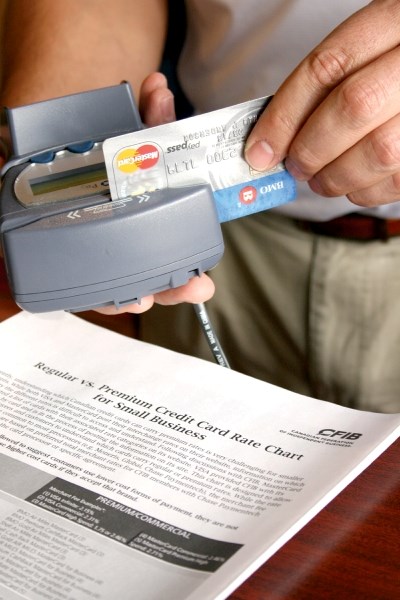As part of a campaign against excessive credit card charges, the Canadian Federation of Independent Business (CFIB) released a list of the country’s most expensive cards, last week.
Typically, businesses are charged 1.75 per cent of the total sale when a customer uses a credit card. However, credit card companies have started increasing fees with newer cards, taking up to 2.71 per cent with so-called “premium” cards.
It adds up quickly, said Jodi Youngberg, owner of Panda Flowers in Airdrie.
“It costs me hundreds of dollars a month, and when the busy season comes, around Valentine’s Day or Mother’s Day, it will be up to $1,000 a month,” she said. “People are quite surprised when I tell them. Most people who have [one of these expensive] cards have another card and are more than willing to use it instead.”
Youngberg has offered discounts if people pay with cash, with some success, but knows that credit cards will always be a part of her business. Most people don’t like to use cheques and credit cards are used almost exclusively to pay for orders sold online.
“Credit cards are nice and convenient, but the fees add up quickly. I’d rather take cash any day of the week,” she said.
“With credit cards, customers pay interest on their balance, businesses pay a percentage, and businesses also pay to have the sales processed. It’s a big racket as far as I’m concerned, but you have to take them. If they all charged the same fees, that would be so much nicer.”
Across the Calgary region, newer high-cost credit cards really impact the small business community’s bottom line, said the CFIB.
“It surely amounts to millions and millions of dollars,” said the CFIB’s Alberta director Richard Truscott. “It can have a really negative impact, especially in the retail sector where margins are already razor thin… and this is an important sector. These are people who are important to the overall economy, as well as heavily involved in their communities.”
The CFIB has launched a public relations campaign, encouraging consumers to avoid using cards that charge higher fees to businesses.
“Small merchants are asking all Canadians to examine the card in their wallets against the list CFIB has issued to check if their card is imposing high costs on local entrepreneurs,” said Dan Kelly, a senior vice president with the CFIB.
“The credit card industry is so confusing, consumers holding a President’s Choice MasterCard, for example, may think they are using a low-cost budget card, but in fact may be forcing merchants to pay 2.5 per cent of their entire purchase in fees to accept the card. This is over 40 per cent more in total fees than a consumer using a regular MasterCard. A consumer collecting Aeroplan points with a CIBC Aerogold Infinite VISA can cause a merchant to pay 30 per cent more in fees than one collecting Aeroplan points with a CIBC Aerogold VISA.”
According to the CFIB’s analysis:
• MasterCard recently introduced an even more expensive credit card. MasterCard World or World Elite cards issued by Bank of Montreal, CIBC, Royal Bank and Capital One are called “premium high spend” cards and can carry among the highest merchant fees out there.
• Of the major banks, Bank of Montreal and CIBC are the main issuers of “premium” credit cards for consumers in Canada – each with six separate high-cost cards. TD Canada Trust and Scotiabank have the fewest premium consumer cards of the major banks, with one each.
• Of the smaller financial institutions, all credit unions, Desjardins, MBNA (recently purchased by TD Canada Trust) and Laurentian have no premium cards for consumers. On the other hand, HSBC has three of its four cards in the premium category.
• Many cards that offer points and rewards to consumers are actually regular credit cards and do not impose higher rates on merchants. For example, the TD Platinum Travel VISA and the ATB Gold Cash Back MasterCard provide consumer benefits at regular merchant costs.
CFIB’s credit card rate chart can be found at www.cfib-fcei.ca/debitcredit
“When you visit a smaller merchant, we ask you to consider paying with a regular cost credit card, your Interac debit card or cash in order to help merchants keep costs down,” Kelly said. “In addition to helping your local entrepreneurs, you’ll be helping keep consumer prices down for us all.”
The CFIB is Canada’s largest association of small- and medium-sized businesses. It was established in 1971, and has nearly 110,000 members in every sector nationwide.



